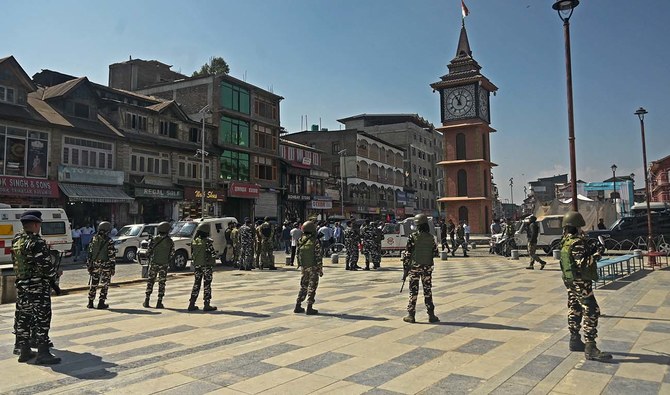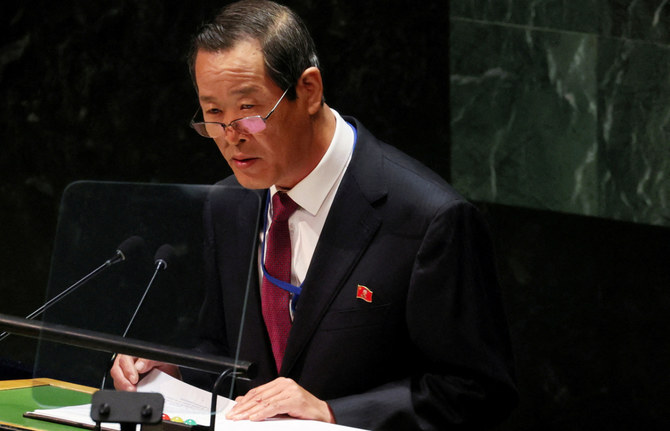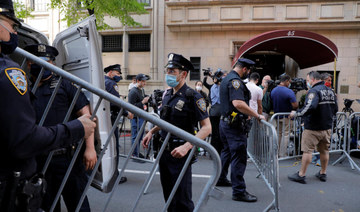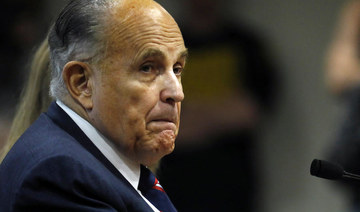NEW YORK: Eighteen electronic devices taken during raids last month on Rudy Giuliani’s home and his law firm in a probe of his dealings in Ukraine belong to Giuliani and employees of his firm, Manhattan prosecutors revealed Thursday.
The previously redacted facts were disclosed when prosecutors re-filed an April 29 letter on the public record in Manhattan federal court. The raids occurred April 28.
They disclosed that 18 electronic devices were seized in the search of locations belonging to the former New York mayor and private lawyer to ex-President Donald Trump and his firm, Giuliani Partners LLC. Prosecutors said the devices belonged to Giuliani and “certain employees” of Giuliani Partners.
The letter had sought the appointment of a “special master” to ensure nothing subject to attorney-client privilege was revealed to the government.
The investigation is examining Giuliani’s ties to Ukraine and whether he violated a federal law that governs lobbying on behalf of foreign countries or entities.
Giuliani has insisted that his activities in Ukraine were conducted on behalf of Trump. At the time, Giuliani was leading a campaign to press Ukraine for an investigation into then-presidential candidate Joe Biden and his son, Hunter.
Some Ukrainians who were in touch with Giuliani have said publicly that they also hoped he could help them with other matters in the US, including arranging meetings with the US attorney general and ousting the US ambassador to Ukraine, Marie Yovanovitch.
Giuliani has maintained through his lawyers that prosecutors had no reason for the raids last month because they had already accessed materials from his Apple iCloud account in 2019.
On the same day of the Giuliani searches, a third search warrant was served on a phone belonging to Washington lawyer Victoria Toensing, a former federal prosecutor and close ally of Giuliani and Trump. Her law firm has said she was informed that she is not a target of the investigation.
In the letter posted publicly Thursday, prosecutors said the device seized from Toensing was brought to the Southern District of New York, which includes Manhattan, on April 28 and the government sought and obtained a warrant to search for device “for evidence of enumerated offenses.”
Prosecutors also withdrew redactions that had referenced search warrants they obtained in November 2019 for iCloud accounts for Giuliani and Toensing and for an email account belonging to Toensing.
They said the government has used a “filter team” composed of prosecutors and FBI agents who are not part of the criminal probe to review the 2019 materials to safeguard materials protected by attorney-client privilege.
Prosecutors said their review of materials taken in 2019 was “substantially complete.” They also said they believed that “some, but not all, of the materials” on the electronic devices seized last month could be the same as materials seized in 2019.
Lawyers for Giuliani have challenged last month’s raids on the grounds that anything gathered from the 2019 search warrants was illegally obtained because investigators improperly intruded on private communications with the president during their secret inquiry.
In a letter to a Manhattan judge that was made public last week, Giuliani’s lawyers said prosecutors treated “a distinguished lawyer as if he was the head of a drug cartel or a terrorist, in order to create maximum prejudicial coverage of both Giuliani, and his most well known client – the former President of the United States.”
Late Thursday, prosecutors publicly filed a response to those arguments, saying that the government has gone above and beyond what is required by requesting appointment of a “special master” to protect Giuliani and Toensing from anything subject to attorney-client privilege.
“To be clear, the mere fact that Giuliani and Toensing are lawyers does not mean that they are above the law or immune to criminal investigation. Yet that is effectively what Giuliani and Toensing argue,” they wrote.
Prosecutors also revealed in the letter that the FBI had successfully downloaded 11 devices belonging to Giuliani and returned them to him. They said seven more devices belonging to Giuliani and his business cannot be fully accessed without a passcode and will require more time to unlock.
They added that the FBI has already downloaded and returned Toensing’s device and investigators have not reviewed any of the materials yet.
Asked about the identities of the other individuals whose devices were seized at Giuliani’s firm, defense attorney Robert Costello said Thursday in a text message that he could not comment.
A spokesperson for prosecutors also declined comment.
18 electronic devices seized by US probers from former Trump lawyer Giuliani and firm
https://arab.news/ynhsa
18 electronic devices seized by US probers from former Trump lawyer Giuliani and firm

- The investigation is examining Giuliani’s ties to Ukraine and whether he violated a federal law that governs lobbying on behalf of foreign countries or entities
Suspected Kashmir rebels kill Indian air force corporal

- Suspected rebels ambushed military convoy in Indian-administered Kashmir, Indian Air Force says
- Since 1989, rebel groups opposed to Indian rule have waged insurgency in disputed territory
SRINAGAR, India: An Indian air force member was killed and four more injured when suspected rebels ambushed a military convoy in Indian-administered Kashmir, an official statement said, as campaigning for national elections continues in the disputed territory.
The convoy was attacked by an unknown number of armed militants who sprayed automatic rifle fire toward at least one air force truck in the mountainous Poonch area, 200 kilometers (124 miles) south of the main city of Srinagar, the air force said in a statement.
Five air force personnel were hit in the firefight late Saturday and “one Air Warrior succumbed to his injuries later,” it said, identifying the dead man as a corporal.
A neighboring constituency took part in the first phase of India’s general election on April 19, and Poonch voters were originally scheduled to cast their ballots this week but the Election Commission of India has postponed the polling to May 25 because of inclement weather in recent days.
Kashmir has been divided between India and Pakistan since their independence in 1947, with both claiming the high-altitude territory in full but administering it in parts.
Since 1989, rebel groups opposed to Indian rule have waged an insurgency in Indian-controlled Kashmir, demanding either independence or a merger with Pakistan.
The conflict has left tens of thousands of civilians, soldiers and militants dead.
Rebel activity in the territory has registered an uptick since last month as campaigning for the elections picked up in the restive region.
In April, three suspected rebels were killed and a police officer and three soldiers wounded in three separate clashes across the territory.
Violence has drastically dropped since 2019, when Prime Minister Narendra Modi’s government revoked the region’s limited autonomy and stepped up a security chokehold.
Voting in India’s six-week-long national election, which started last month, will end on June 1.
Driver dies after crashing into White House perimeter gate, Secret Service says

- The driver was not immediately identified
WASHINGTON: A driver died after crashing a vehicle into a gate at the White House Saturday night, authorities said.
The driver was found dead in the vehicle following the crash shortly before 10:30 p.m. at an outer perimeter gate of the White House complex, the US Secret Service said in a statement.
Security protocols were implemented but there was no threat to the White House, the agency said.
The driver was not immediately identified.
The Secret Service will continue to investigate the matter, while turning over the fatal crash portion of the investigation to the Washington Metropolitan Police Department, the agency said.
Fake videos of Modi aides trigger political showdown in India election

- Indian police arrest nine people for circulating fake video of Indian Home Minister Amit Shah
- With more than 800 million Internet users, tackling misinformation in India is a huge challenge
BENGALURU/LUCKNOW: Manipulated videos are taking center stage as campaigning heats up in India’s election, with fake clips involving two top aides of Prime Minister Narendra Modi triggering police investigations and the arrest of some workers of his rival Congress party.
In what has been dubbed as India’s first AI election, Modi said last week fake voices were being used to purportedly show leaders making “statements that we have never even thought of,” calling it a conspiracy “to create tension in society.”
Indian police — already investigating the spread of fake videos showing Bollywood actors criticizing Modi — are now investigating a doctored online clip that showed federal home minister Amit Shah saying the ruling Bharatiya Janata Party will stop certain social guarantees for minorities, a subject sensitive for millions of voters.
Shah retorted on X, posting his “original” and the edited “fake” speech and alleging — without providing any evidence — that the main opposition Congress was behind the video it created to mislead the public. The minister said “directions have been issued to the police to address this issue.”
Indian police arrested at least nine people, including six members of Congress’ social media teams, in the states of Assam, Gujarat, Telangana and New Delhi last week for circulating the fake video, according to police statements.
Five of the Congress workers were released on bail, but the most high-profile arrest made by the cybercrime unit of New Delhi police came on Friday, when they detained a Congress national social media coordinator, Arun Reddy, for sharing the video. New Delhi is one region where Shah’s ministry directly controls police. Reddy has been sent into three-day custody.
The arrest has sparked protests from Congress workers with many posting on X using the #ReleaseArunReddy tag. Congress lawmaker Manickam Tagore said the arrest was an example of “authoritarian misuse of power by the regime.”
Congress’ head of social media, Supriya Shrinate, did not respond to messages and an email seeking comment.
MISINFORMATION
India’s election from April 19 to June 1 will be the world’s largest democratic event. With nearly a billion voters and more than 800 million Internet users, tackling the spread of misinformation is a high stakes job. It involves round-the-clock monitoring by police and election officials who often issue take down orders to Facebook and X as investigations start.
In India’s most populous state of Uttar Pradesh, more than 500 people keep tabs on online content, flagging controversial posts and coordinating with social media companies for their removal when needed, police chief Prashant Kumar told Reuters on Saturday.
Another fake video that sparked a storm last week showed Yogi Adityanath, the state’s chief minister, criticizing Modi for not doing enough for families of those who died in a 2019 militant attack. Though fact checkers said the video was created using different parts of an original clip, state police called it an “AI generated, deepfake.”
Using Internet address tracking, state police arrested a man named Shyam Gupta on May 2 who had shared the fake video post on X a day earlier, receiving over 3,000 views and 11 likes.
The police have accused Gupta of forgery and promoting enmity under Indian law provisions that can carry a jail term of up to seven years if convicted. Reuters could not reach him as he is currently serving a 14-day custody period.
“This person is not a tech guy. Had he been tech savvy, arresting him quickly would not have been possible,” said police officer Kumar.
Australian police shoot boy dead after stabbing with ‘hallmarks’ of terrorism

SYDNEY,: Australian police said on Sunday they had shot dead a boy after he stabbed a man in Western Australia’s capital Perth, in an attack authorities said indicated terrorism.
There were signs the 16-year-old, armed with a kitchen knife, had been radicalized online, state authorities said, adding they received calls from concerned members of the local Muslim community before the attack, which occurred late on Saturday night.
The attack, in the suburb of Willetton, had “hallmarks” of terrorism but was yet to be declared a terrorist act, police said.
“At this stage it appears that he acted solely and alone,” Western Australia Premier Roger Cook told a televised press conference in the state capital Perth, regarding the attacker.
The victim, stabbed in the back, was stable in hospital, authorities said.
Prime Minister Anthony Albanese said he had been briefed on the incident by police and intelligence agencies, which advised there was no ongoing threat.
“We are a peace-loving nation and there is no place for violent extremism in Australia,” Albanese said on social media platform X.
The incident comes after New South Wales police last month charged several boys with terrorism-related offenses in investigations following the stabbing of an Assyrian Christian bishop while he was giving a live-streamed sermon in Sydney, on April 15.
The attack on the bishop came only days after a stabbing spree killed six in the Sydney beachside suburb of Bondi.
Gun and knife crime is rare in Australia, which consistently ranks among the safest countries in the world, according to the federal government. (Reporting by Sam McKeith in Sydney; Editing by Christian Schmollinger and William Mallard)
North Korea’s UN ambassador says new sanctions monitoring groups will fail

- Earlier this year, Russia vetoed the annual renewal of a panel of experts amid US-led accusations that North Korea has transferred weapons to Russia for use in its war in Ukraine
SEOUL: Efforts led by the US and other Western countries to form new groups to monitor sanctions on North Korea will fail, the country’s UN envoy said on Sunday, according to state media KCNA.
Ambassador Kim Song made the comment in response to a joint statement the US and its allies issued this week calling to continue the work of a UN panel of experts monitoring longstanding sanctions against Pyongyang for its nuclear weapons and missile programs.
Earlier this year, Russia vetoed the annual renewal of the panel amid US-led accusations that North Korea has transferred weapons to Russia for use in its war in Ukraine.
“The hostile forces may set up the second and third expert panels in the future but they are all bound to meet self-destruction with the passage of time,” KCNA quotes Kim as saying in a statement.
Last month, US Ambassador to the United Nations Linda Thomas-Greenfield visited the Demilitarized Zone, a heavily fortified border between the two Koreas, which remain technically at war and urged Russia and China to stop rewarding North Korea for its bad behavior.
Her trip came after Russia rejected the annual renewal of the multinational panel of experts that has over the past 15 years monitored the implementation of UN sanctions aimed at curbing North Korea’s nuclear and missile programs.
















